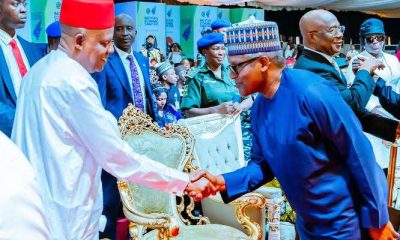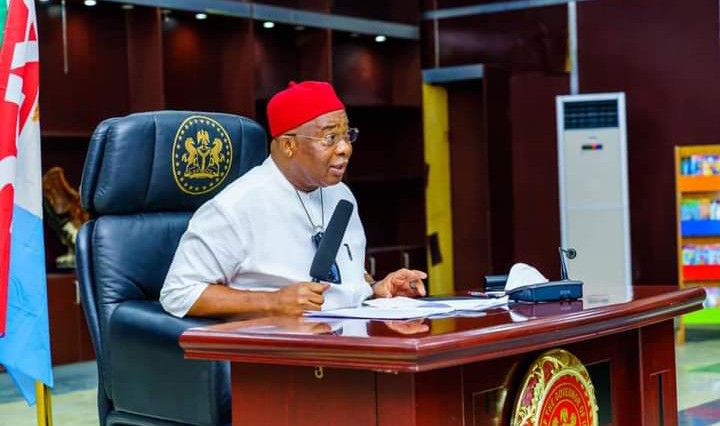Politics
Imo 2027: Uzodimma downplays zoning, charges Owerri zone leaders on unity

Imo State Governor Sen. Hope Uzodimma has dramatically changed tactics regarding his much-promised slogan of handing over power to Owerri Zone in 2027.
Previously, Uzodimma had consistently indicated his readiness to abide by the recommendation of the Imo Elders Council, which advised through the Imo Charter of Equity to elect the next governor of the state from Owerri Zone.
During the 2023 electioneering campaign, Uzodimma made this a central campaign issue while visiting the nine Local Government Areas in Owerri Zone. He assured and reassured the masses of his preparedness to work for the election of one of their own in 2027.
It was on this premise that APC and non-APC members from Owerri Zone put their political differences aside and worked for his re-election during the November 11, 2023 governorship election.
The understanding was that if Uzodimma was re-elected, the coast would be clearer for justice, equity, and fairness to play out in 2027, allowing Owerri Zone to produce the governor’s successor.
However, in more than three instances since his second-term inauguration, Uzodimma has repeatedly insisted that “power is taken, not given.” During his last meeting with Owerri Zone leaders, Uzodimma succinctly proclaimed that he had no powers to handpick his successor. He no longer guaranteed them his support for the emergence of his successor from Owerri Zone. The leaders were undoubtedly shocked and surprised.
Uzodimma revealed that although he was the brain behind the Imo Charter of Equity—which he explained was his contribution to ensuring “inclusivity and justice in power rotation among the three zones of the state”—the central theme of electing someone from Owerri Zone in 2027 would be subjected “to democratic norms.”
Even when the Owerri Zone leaders declared they would support any candidate chosen by Uzodimma from Owerri Zone as his successor, the governor still responded in the negative. He maintained that while the Charter of Equity serves as a compass, “it is not an automatic right because any zone that wants to produce the next governor must work with the other zones to realize their aspirations.
“Charter of Equity is not a slogan for confusion; it is a document to let us know and remember the imbalance in the system and see how best to correct it—but not for people to enter social media and circulate fake news. We cannot continue like this every time,” he said.
The governor advised the Owerri Zone leaders on what to do. “You must join me now for us to cure this confusion, because if we don’t cure this confusion under my watch, the man coming after me may not be as religious and God-fearing as I am,” he stated.
He maintained that Imo State desires creative thinkers who are committed to serving the people and making strong, informed leadership decisions that encourage development.
The leader of the delegation, Chief Charles Amadi, thanked the governor for his vision in putting together the Imo Charter of Equity, which he said “will check imbalance, injustice, and foster peace in the state.”
Other members of the Imo Harmony Project delegation included immediate past Deputy Governor Prof. Placid Njoku, Barr. Lious Alozie, Ambassador Kema Chikwe, Captain Emmanuel Iheanacho, and Chief Henry Njoku, among others.
It would be recalled that Owerri Zone has been clamouring for one of their own to be elected as Uzodimma’s successor in 2027. Since the state’s creation, no one from Owerri Zone has ever successfully completed a full four-year term as governor.
On the other hand, Okigwe Zone has ruled for eight years, and Orlu Zone, by 2027, would have been in power for 24 years, while Owerri Zone has yet to complete even two years in office.
The late Sen. Evan Enwerem served only a few months before the Abacha coup of November 11, 1993, sent him out of Douglas House. Rt. Hon. Emeka Ihedioha worked hard and was elected in 2019, yet he served for only seven months before a controversial Supreme Court judgment removed him from office.
Uzodimma came in as governor and solicited the support of Owerri Zone leaders, insisting he would ensure a power shift to Owerri Zone in 2027. Unexpectedly, he has started singing a different tune, to the astonishment of Owerri Zone leaders.








